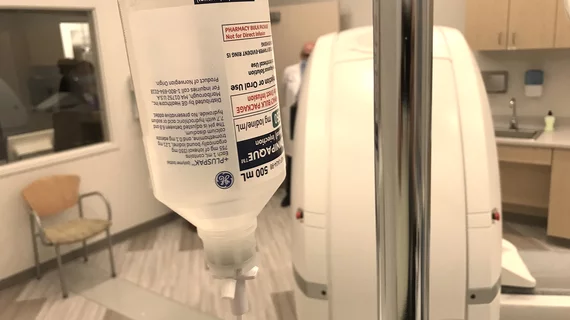Preserving contrast media supplies: 7 ACR recommendations
Since the medical industry has begun to feel the impact of the nationwide shortage of intravenous contrast media, organizations are being tasked with making serious adjustments to preserve their supplies.
With the shortage, which pertains specifically to all formulations and concentrations of GE Healthcare’s Omnipaque (iohexol), expected to last until mid-June, several organizations have alluded that conservation efforts are of critical importance. For this reason, the American College of Radiology (ACR) released a statement addressing the situation, which they describe as an “emergency,” along with a list of conservation recommendations.
“The ACR Committee on Drugs and Contrast Media, within the ACR Commission on Quality and Safety, is aware of the current global shortage of iodinated contrast media,” the statement reads. “The recommendations are not exhaustive or prescriptive. They are intended as a resource for imaging providers and their institutions to continue to provide high-quality patient care during times of shortage of contrast media."
Below are some of the following risk mitigation strategies shared by the ACR:
Explore and utilize alternative imaging modalities to answer clinical questions. A list of suggestions can be found under the “Explore by scenario” icon in the ACR Appropriateness Criteria Guidelines.
Check with multiple vendors for supply and consider alternative versions of contrast that will suffice in various clinical scenarios. The ACR recommends keeping supplies from multiple vendors when possible.
Contact your institution’s pharmacy if there is a surplus of higher volume single dose vials in stock to see if the contrast can be safely repackaged into smaller dose vials to eliminate waste.
Reduce contrast doses based on weight, when possible.
Reduce doses with lower kVp protocols.
Reserve higher concentrations for angiographic studies.
Consider nonionic contrast alternatives for oral, rectal, genitourinary administration (examples: iothalamate meglumine or diatrizoate).
Though iodinated contrast is currently and will continue to be in short supply for the next several weeks, the ACR cautions that doses should not be reduced to the point of suboptimal image quality.
For the complete list of ACR recommendations, click here. For more information on the appropriate use of iodinated contrast media, refer to the ACR Contrast Manual.
Related contrast media news:
VIDEO: American College of Radiology working with FDA to mitigate contrast shortage — Interview with Alan H. Matsumoto, MD
ACR working with FDA and HHS to help address imaging contrast shortage
Be prepared: IV contrast media shortage could last up to 8 weeks
FDA issues safety warning for iodinated contrast media use in children
Allergic reactions to iodinated CT contrast increase likelihood of sensitivity to GBCAs
Simple, proven strategies to reduce extravasation of contrast media during CT scans
Gadolinium can be used as substitute for iodine contrast in some interventional imaging procedures
VIDEO: Gadolinium being substituted for iodine contrast in some procedures due to shortage — Interview with Alan H. Matsumoto, MD
GE provides update on contrast media shortage
VIDEO: How the iodine contrast shortage is impacting interventional cath labs — Interview with Kirk Garratt, MD
VIDEO: Imaging contrast shortage is delaying procedures and causing rationing — Interview with Alan H. Matsumoto, MD
Frontline perspectives on the CT contrast shortage: 5 notable quotes

